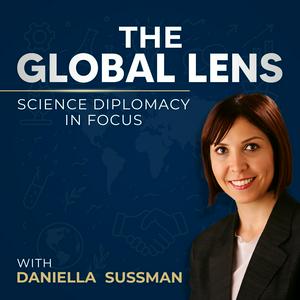EP1 Decoding the Exposome, AI, and Policy with Dr. Thomas Hartung
OVERVIEWIn this episode, Daniella Sussman speaks with Dr. Thomas Hartung about how the human exposome is reshaping our understanding of disease and environmental health. Their conversation explores how new scientific insights are sparking global cooperation and policy innovation, demonstrating the power of science diplomacy to unite diverse stakeholders in a common cause. Together, they consider how technology, data, and global governance could redefine public health for generations to come.EPISODE SUMMARYDr. Hartung explains why mapping the human exposome could become as transformative as the Human Genome Project, unlocking a deeper understanding of the environmental factors behind chronic disease and rising autism rates. He shares how artificial intelligence is uncovering patterns in massive datasets that were previously impossible to detect, making it possible to move beyond slow and outdated animal testing methods. The discussion turns to the economic, ethical, and regulatory pressures driving innovation, with science diplomacy playing a critical role in harmonizing standards, improving data sharing, and ensuring that countries work toward shared goals. With billions at stake and global health on the line, this episode offers an inspiring look at how scientific leadership, policy vision, and cutting-edge technology can converge to protect the most vulnerable.In this episode, we discuss:02:57 - Defining the exposome and why policymakers should care06:11 - The role of artificial intelligence in processing vast exposome datasets11:23 - Market forces and private investment accelerating expo-tech innovation, with autism as a case study12:58 - The limitations of animal testing for modern safety needs14:52 - Economic, regulatory, and ethical drivers pushing toward non-animal testing16:54 - How science diplomacy, governance standards, and open access publishing can enable global exposome collaboration22:24 - The milestones and policy signals needed to make the Human Exposome Moonshot a coordinated international effort.ABOUT THE GUESTThomas Hartung, MD, PhD, is a global leader in evidence-based toxicology and science policy. He holds the Doerenkamp-Zbinden Chair at Johns Hopkins University, where he teaches and conducts research across the Bloomberg School of Public Health, the Whiting School of Engineering, and the School of Medicine. He also directs the Center for Alternatives to Animal Testing (CAAT), advancing more humane and scientifically rigorous approaches to safety science. Dr. Hartung has authored over 700 scientific publications, served as founding editor of Frontiers in Artificial Intelligence, and has shaped regulatory science on both sides of the Atlantic, from his time at the European Commission to advisory roles with the U.S. Environmental Protection Agency and Apple’s Green Chemistry Board. In 2025, he launched the Human Exposome Moonshot Forum, bringing together more than 60 organizations to chart the future of environmental health. With a career that bridges policy, innovation, and education, including courses that have reached over 22,000 learners on Coursera, Dr. Hartung is helping to redefine how science informs global health and regulation.MENTIONED IN THE EPISODE:🔹 (Studies or Research) Human Exposome Moonshot Forum Declaration 2025 – https://exposomemoonshot.org/declarationsigning/🔹 (Studies or Research) Real World Data Initiative – NIH – https://factor.niehs.nih.gov/2025/6/feature/global-exposome-consortium🔹 (Reference) Food Safety Modernization Act (FSMA) – https://www.fda.gov/food/guidance-regulation-food-and-dietary-supplements/food-safety-modernization-act-fsma🔹 (Reference) Human Genome Project – https://www.genome.gov/human-genome-project🔹 (Website) Center for Alternatives to Animal Testing (CAAT) –...


